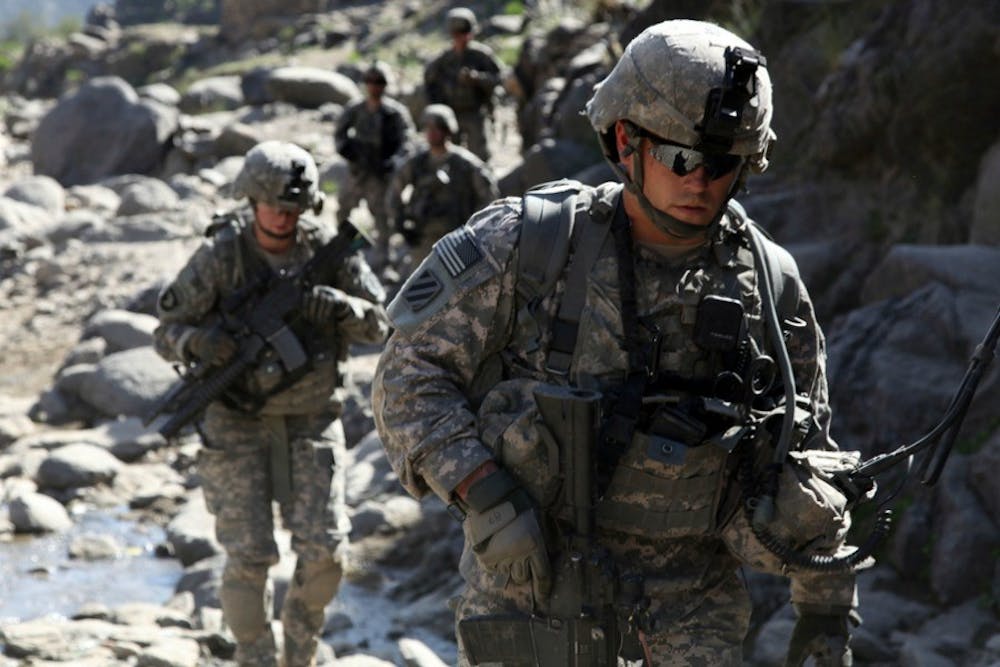Milam's Musings, milambc@miamioh.edu
In October of 2001, I had only just started the sixth grade. I was a small, nerdy kid (not much has changed) that loved to read R.L. Stine's "Fear Street" series and watch The Twilight Zone.
At the same time as my sixth grade adventures, the United States under George W. Bush's first term began Operation Enduring Freedom (as you'll find out, dear reader, "enduring" is the key word here) on Oct. 7, 2001 in Afghanistan.
The stated aim in 2001 was to dismantle al-Qaeda in the aftermath of the 9/11 attacks and deny them a safe haven in Afghanistan, which then entailed taking on the Taliban.
To be sure, at that time, the United States had a lot of good-will due to the atrocity of the 9/11 attacks; the British, Canadian, Australian, German and French troops all went in with us.
"Given the nature and reach of our enemies, we will win this conflict by the patient accumulation of successes, by meeting a series of challenges with determination and will and purpose," Bush said at the beginning of the war.
Now, 14 years later, three more presidential terms, a Republican and a Democrat, and I'm in my senior year of college, the United States is still "enduring" in Afghanistan. To push the point further: there are kids born after 9/11 on the brink of high school that have never known a day when the United States wasn't warring with Afghanistan.
There was also President Obama's Dec. 1, 2009 surge in Afghanistan, which brought in an additional 30,000 U.S. troops to the region.
"This increase is necessary to stabilize a deteriorating situation in Afghanistan, which has not received the strategic attention, direction and resources it urgently requires," Obama said at the time.
Overall, when Obama took office, there were 34,000 troops in Afghanistan and by the summer of 2010, the number was 98,000. By 2012, the surge was considered over and troop levels went down to 68,000.
Then in December 2014, Obama declared the Afghanistan war officially over, which was an odd choice of words since it wasn't over. More than 10,000 troops remained in Afghanistan after that declaration and Obama, according to the New York Times, secretly expanded the combat role of U.S. troops.
Worse than that, 2014 was the deadliest year on record for civilians since record-keeping began in 2009. The UN documented 3,699 civilian deaths for the year and since 2001, it's at 18,000 total.
Enjoy what you're reading?
Signup for our newsletter
Even more startling, of the 3,699 civilians killed, 714 were children and another 1,760 were wounded. To be clear, the UN report attributed 72 percent of civilian casualties to insurgents, but those insurgents only could be insurgents in a country the United States and its allies turned upside down.
"I think Americans have learned that it's harder to end wars than it is to begin them," Obama said in May of 2014.
No freaking kidding. The enduring part of Operation Enduring Freedom doesn't end there, however: Obama announced this Thursday that U.S. forces will remain in Afghanistan at their current levels through next year and by 2017, when he leaves office, a force of 5,500 will remain, according to the Wall Street Journal.
This contrasts with Obama's previous plan of only having 1,000 troops at the U.S. embassy once he left office. All of which, by the way, will cost $14.6 billion.
"I'm therefore announcing the following steps, which I am convinced offer the best possibility for lasting progress in Afghanistan," Obama said in a speech Thursday, going on to mention the reversal on withdrawing.
By the point of the new timetable, Operation Enduring Freedom will be "enduring" for 16 years with a third president and a fifth term and still with still no end in sight.
More atrocities continue to happen in Afghanistan, all these years later, too. For instance, on Oct. 3, the United States bombed a Médecins Sans Frontières/Doctors Without Borders hospital in Kunduz, Afghanistan, killing twelve staff members, at least 10 patients, including three children.
But it gets worse. MSF staff had provided the GPS coordinates of the hospital, which served wounded individuals on both sides of the conflict, to coalition and Afghan military and civilian officials only five days prior on Sep. 29.
Then once the bombing began, MSF staff called U.S. military officials to let them know they were bombing their hospital, but those pleas went unheeded, as the bombing continued for another 30 minutes.
"We demand total transparency from Coalition forces. We cannot accept that this horrific loss of life will simply be dismissed as 'collateral damage'," Meinie Nicolai, MSF President, said.
Quite the world we live in when the 1999 Nobel Peace Prize-winner (MSF) is bombed by the 2009 Nobel Peace Prize-winner (President Obama).
At the end of John Lennon's 1971 song, "Happy Xmas (War is Over)," he said, "War is over, if you want it."
It's unclear when this "enduring" paradigm will change where the United States is no longer perpetually at war, covertly and overtly, with ground troops and drone bombings, and in various countries (Afghanistan, Iraq, Syria, Libya, Somalia and so on).
After 14 years and changing narratives and strategies, not to mention Afghanistan being an unsexy topic to begin with, it's easy to see how apathy has set in with the American public.
While, sure, an Oct. 2012 Pew Research poll showed six-in-10 Americans wanted U.S. troops removed from Afghanistan as soon as possible, war issues in general routinely rank far below domestic issues.
In a 2014 Gallup poll, war and terrorism were almost at the bottom of the issues with only two percent, respectively, whereas the issues of government, the economy, unemployment, healthcare and immigration topped the charts.
War is over if we want it, but eh, it's thousands of miles away and that's for others to figure out.




